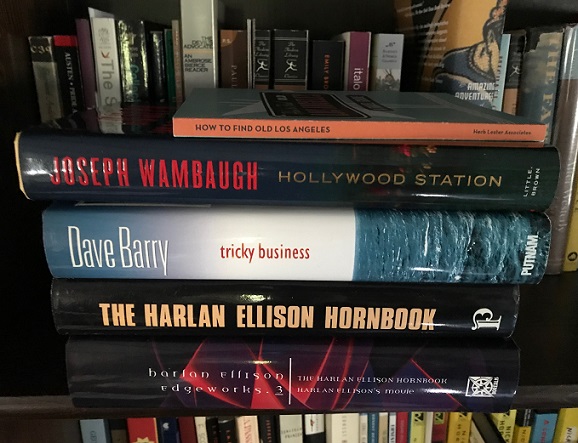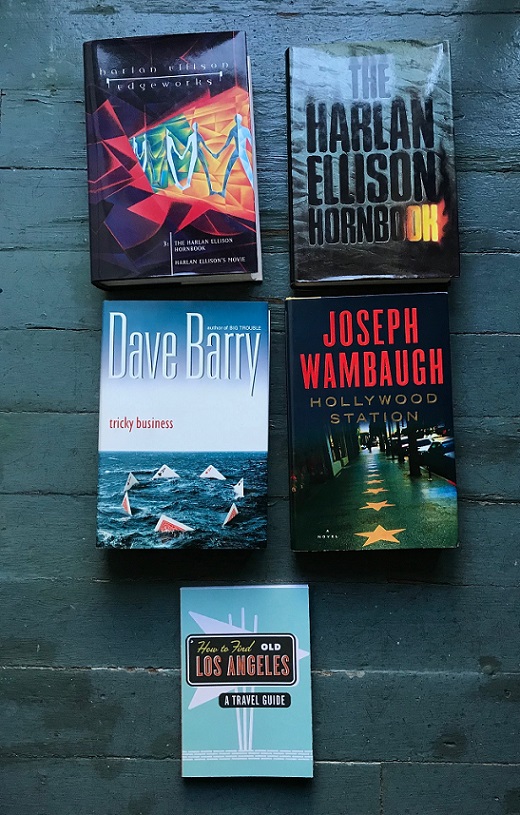Books acquired: “Not Dead Yet,” Phil Collins
Books read: “The Harlan Ellison Hornbook,” “Edgeworks Vol. 3,” Harlan Ellison; “Tricky Business,” Dave Barry; “Hollywood Station,” Joseph Wambaugh; “How to Find Old Los Angeles,” Kim Cooper
March saw me continue my focus on reading books I’ve meant to read for years, plus one short one that was easily dispensed with.
“The Harlan Ellison Hornbook” (1990) collects general interest, usually autobiographical columns the writer best known for science fiction wrote for LA alt-weeklies in 1972-3, after his Glass Teat TV columns for the same venues. These are minor entries in his oeuvre. The one about how he hates Christmas is a welcome jolt, though. The added essays at the back, including one defending the positive impacts of the 1960s, were more substantive. I bought this used at Moe’s in Berkeley in 2004.
“Edgeworks, Vol. 3” (1996) collects “Hornbook” and an unproduced script, “Harlan Ellison’s Movie,” from the same era. It’s about a young idealist who inherits a bank and sets out to change the world. It has its moments, but it’s ultimately as heavy-handed and self-indulgent as a project titled “Harlan Ellison’s Movie” would suggest. I bought this omnibus when it came out, nearly 22 years ago. It was part of a series aiming to collect all his work but which ended at Vol. 4. I still have Vol. 1 to read.
“How to Find Old LA” (2016) is a slim, illustrated guidebook with a good mix of better- and lesser-known spots — diners, steakhouses, bars and more that retain the feel of the old days — organized by area and with handy capsule descriptions. Many of the listings were unknown to me, so as I read I kept a running list of places I’d like to check out. I bought this at Distant Lands travel store in Pasadena in 2016.
“Tricky Business” (2002) was the humorist’s second crime novel. It’s a breezy caper with a dozen-plus characters, in which things work out pretty much as you’d hope: good things happen to good people, bad things to bad people. The fun is in getting there. As a Dave Barry fan, it’s interesting to see how he adapts his writing style to fiction. There’s gunplay, and romance, and an amateur rock band, and also literature’s best mass puking scene. That said, I suspect I’m going to forget it pretty quickly. I bought this at Vroman’s upon publication and Barry signed it to me. It’s the last Dave Barry book I own that I hadn’t read.
“Hollywood Station” (2006) was Wambaugh’s return to the LAPD as subject after almost 30 years away. The novel brings him into the era of post-Rodney King federal oversight, cell phones, woman cops, ethnic food and hair gel. You may think there are too many characters and not enough plot, but the scenes of day to day life on the beat are vivid, Wambaugh’s characters seem real and he succeeds in humanizing his cops and sending up the bureaucracy. It’s definitely sunnier than “The Choirboys,” the only other Wambaugh I’ve read.
I got this directly from Wambaugh during a December 2006 interview at Vroman’s that focused on his childhood here and, as I was reading “Choirboys” at the time, I set this aside to read at a later date. A much later date, as it turned out.
Yeah, it’s a little embarrassing that it took me 11 years and some change to get to this book, and 15-plus years to get to Barry’s, and even longer to get to one of the Ellison books, but that’s how it goes sometimes. It’s not like I wasn’t reading other books. On the bright side, it’s satisfying to have these read, and I would recommend Wambaugh’s book with few reservations, Barry’s with more reservations and Cooper’s if you’re into that kind of thing.
I managed to finish these all by the 21st, with “Hornbook” having largely been read in January and February, and spent the last part of March reading chunks of three other books. Then I got a running start on an 800-pager, which I was going to read in stages during 2018 but which is enjoyable enough that I’m going to keep reading. If I can average 20 pages a day in April, which I believe I can, I can finish it.
How was your March, readers? Let us know, please.
Next month: one or two (or three?) looks back at the 20th century.


